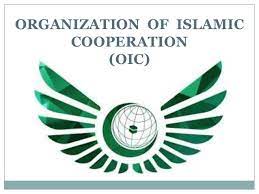
Organization of Islamic Cooperation (OIC)

16.12.2023
Organization of Islamic Cooperation (OIC) , Daily Current Affairs , RACE IAS : Best IAS Cooaching in Lucknow
|
For Prelims:About Organization of Islamic Cooperation,Members,Objective For Mains Paper:About Article 370,Significance and logic behind Article 370,Controversies and criticisms related to Article 370 |
Why in the news?
Recently, India rejected a statement by the Organization of Islamic Cooperation on the Supreme Court verdict on Article 370.
Key Points
- The OIC had expressed concern over the apex court order, which on Monday, ruled that Article 370 was a temporary provision.
- The OIC General Secretariat reiterated its call to reverse all illegal and unilateral measures taken by India ever since, seeking to change the internationally-recognised disputed status of the territory.
About Organization of Islamic Cooperation
- The OIC claims to be the “collective voice of the Muslim world”.
- It was established at a 1969 summit in Rabat (Morocco) after what it describes as the ‘criminal arson’ of Al-Aqsa Mosque in Jerusalem.
- It is the second-largest intergovernmental organization in the world after the United Nations, with a collective population reaching over 1.8 billion.
- The OIC partners with international mechanisms (including every specialized UN agency), governments, and civil society organizations (CSOs) to address issues of concern to its member states and Muslims worldwide.
- Its official languages are Arabic, English, and French.
Members:
- It has 57 member Countries.
- India is not a Member of OIC.
Headquarters: Jeddah, Saudi Arabia.
Objective:
- To safeguard and protect the interests of the Muslim world in the spirit of promoting international peace and harmony among various people of the world.
About Article 370:
- Article 370 is one of the most controversial and controversial provisions in the Constitution of India. It grants special autonomy to the region of Jammu and Kashmir, giving it its own constitution, flag and powers to take important decisions.
- This article was mentioned in Part XXI of the Indian Constitution, titled "Temporary, Transitional and Special Provisions".
- Article 370 mentioned in the Constitution has been the subject of political, legal and social discussion since its inception.
Revocation of Article 370:
- On August 5, 2019, the Government of India abrogated Article 370, in force since 1954, by a presidential order.
- The order was based on a proposal that received a two-thirds majority in both houses of the Indian Parliament.
- As a result, all clauses of Article 370, except clause 1, were inoperative by a subsequent order on 6 August.
- Additionally, the Indian Parliament also approved the Jammu and Kashmir Reorganization Act, 2019, which led to the bifurcation of the state of Jammu and Kashmir into two union territories: Jammu and Kashmir and Ladakh. This restructuring took effect on October 31, 2019.
- Following the government's intention to abrogate Article 370 of the Constitution, the Supreme Court of India received a total of 23 petitions. In response, a five-judge bench was formed to address the legal challenges. This bench justified the repeal of this article.
Significance and logic behind Article 370:
- To respect and preserve the unique identity, history and culture of the state of Jammu and Kashmir. This provision acknowledges the distinctiveness of the territory and allows it to have its own constitution, flag and important decision-making powers.
- This provision addresses the unique aspirations of the history and people of Jammu and Kashmir.
- Article 370 promotes federal spirit and national unity by granting special autonomy to Jammu and Kashmir within the framework of the Indian Constitution.
- Article 370 plays a role in protecting the territorial integrity of Jammu and Kashmir within the Indian Union.
- This provision promotes harmonious relations between the Jammu and Kashmir region and the rest of India.
- Article 370 exemplifies India's commitment to democratic principles by respecting the choice of the people of Jammu and Kashmir for their own Constitution and laws.
- It exemplifies the idea of “unity in diversity” by accommodating the specific needs of the region within the larger democratic framework
Controversies and criticisms related to Article 370:
- Critics argue that Article 370 has hindered the full integration of Jammu and Kashmir with the rest of India. This provision has encouraged separatism in the country.
- This article provides special privileges and benefits to the residents of Jammu and Kashmir, including special rights in matters of property ownership, education and employment in the government. Critics argue that this has led to unequal treatment and discrimination against citizens from other parts of India.
- Some critics argue that the special status given to Jammu and Kashmir has hindered its development. He believes that the region's autonomy has limited the central government's ability to effectively implement welfare and development programs.
- In the last few years, there have been allegations of misuse of autonomy given under Article 370 by some political leaders. Critics claim that this has led to a lack of accountability and transparency in governance, resulting in mismanagement of resources and governance in the state.
- This provision has been hindering the implementation of security and anti-terrorism laws in Jammu and Kashmir. Critics argue that this compromises national security and hinders the fight against terrorism.
Some political parties have opposed Article 370, arguing that it hinders uniformity and equal treatment of all states within the Indian Union